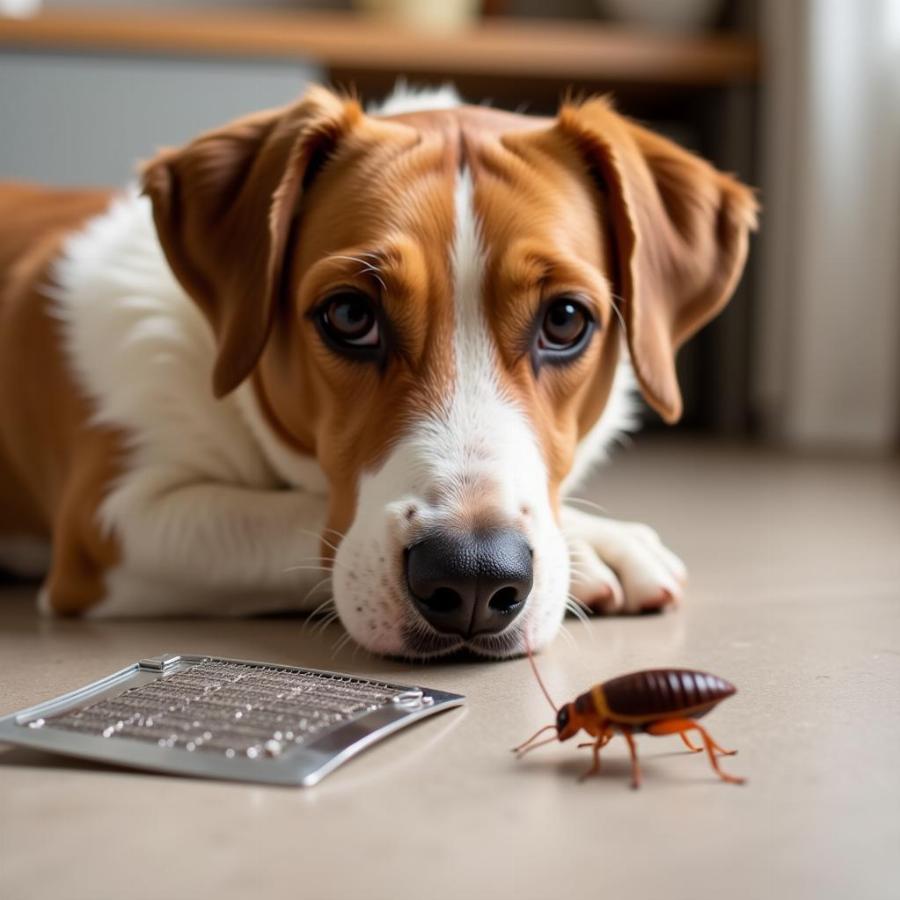If your dog just gobbled down a cockroach, you’re probably feeling a mix of disgust and concern. It’s a natural reaction! This article will explore everything you need to know about dogs eating cockroaches, from the potential risks to when you should seek veterinary attention. We’ll cover prevention strategies and provide practical advice to ensure your furry friend stays safe and healthy.
Is Eating a Cockroach Harmful to My Dog?
Generally speaking, eating a single cockroach isn’t likely to cause serious harm to a healthy dog. Their digestive systems are relatively robust and can handle small amounts of unusual things. Think of it like accidentally swallowing a small bug yourself – unpleasant, but usually harmless. However, there are some potential risks to be aware of.
Potential Risks of Cockroach Ingestion
- Pesticide Exposure: Cockroaches are often targets of pesticides, and if your dog eats a recently poisoned roach, they could ingest these toxins. This is the most significant concern and requires immediate veterinary attention.
- Parasites: Cockroaches can carry parasites like roundworms, which can be transmitted to dogs. While not all cockroaches carry parasites, it’s a possibility to consider.
- Gastrointestinal Upset: Some dogs may experience vomiting or diarrhea after eating a cockroach, simply due to the unfamiliar substance in their system.
- Allergic Reactions: Although rare, some dogs may be allergic to cockroaches and could experience an allergic reaction after ingestion. Symptoms might include itching, swelling, or difficulty breathing.
What Should I Do If My Dog Eats a Cockroach?
First, don’t panic. Monitor your dog closely for any unusual signs. Look for symptoms like vomiting, diarrhea, lethargy, loss of appetite, or difficulty breathing. If you notice any of these symptoms, contact your veterinarian immediately.
When to Contact Your Vet
- Suspected Pesticide Poisoning: If you suspect your dog ate a cockroach that had been exposed to pesticides, seek immediate veterinary care. Time is of the essence in these situations.
- Persistent Vomiting or Diarrhea: While occasional vomiting or diarrhea might resolve on its own, persistent gastrointestinal upset can lead to dehydration and requires veterinary attention.
- Signs of an Allergic Reaction: If you observe any signs of an allergic reaction, such as facial swelling, hives, or difficulty breathing, contact your vet immediately.
- Changes in Behavior: If your dog seems unusually lethargic, disoriented, or exhibits any other concerning behavioral changes, contact your vet.
How Can I Prevent My Dog from Eating Cockroaches?
The best way to protect your dog is to prevent cockroach infestations in the first place. This involves keeping your home clean, storing food properly, and sealing any cracks or crevices where roaches can enter.
Tips for Preventing Cockroach Infestations
- Regular Cleaning: Clean up food spills immediately and regularly sweep and vacuum floors.
- Proper Food Storage: Store pet food and human food in airtight containers.
- Seal Entry Points: Seal cracks and crevices in walls, floors, and around windows and doors.
- Professional Pest Control: Consider contacting a pest control service for regular treatments.
 Dog looking curiously at a roach trap
Dog looking curiously at a roach trap
Can Pest Control Dogs Eat Roaches?
It’s worth noting that some dogs are specifically trained for pest control. These dogs are taught to identify and eliminate pests, including cockroaches. However, even these dogs can be at risk from pesticide exposure, so proper training and precautions are essential. Learn more about pest control dogs on our dedicated page: pest control dogs. What if you’re wondering about the general safety of roaches for canine consumption? We’ve got that covered too: can dog eat roaches.
Conclusion
While a single cockroach likely won’t harm your dog, it’s best to prevent ingestion whenever possible. Be vigilant about pest control, monitor your dog’s behavior, and contact your veterinarian if you notice anything unusual after your dog ate a cockroach. Keeping a clean environment and being proactive about pest control are the best ways to safeguard your furry companion’s health and well-being.
FAQ
- What are the signs of pesticide poisoning in dogs?
- Can cockroaches make my dog sick?
- How can I get rid of cockroaches in my house?
- Are there natural cockroach repellents safe for pets?
- Should I induce vomiting if my dog eats a cockroach?
- What parasites can dogs get from cockroaches?
- How often should I have my home treated for pests?
Related Questions
- What to do if my dog eats a poisoned rat?
- How to treat intestinal parasites in dogs?
- Home remedies for dog vomiting and diarrhea.
Beaut Dogs is your one-stop resource for all things related to dog care. We provide expert advice and information to help you understand your canine companion better. From breed-specific needs to health and nutrition, we cover it all. When you need assistance, please email us at [email protected] for detailed and accurate answers from Beaut Dogs. Visit https://beautdogs.com to learn more about the wonderful world of dogs!